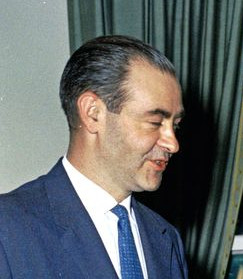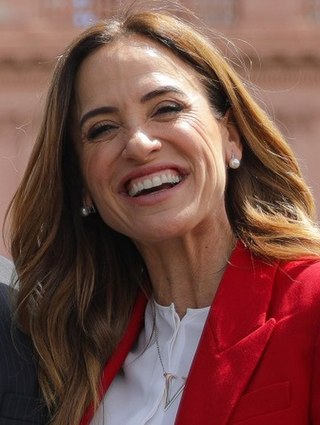Lorenzo Juan Sigaut (born 6 June 1933) is an Argentine economist.
Contents

Lorenzo Juan Sigaut (born 6 June 1933) is an Argentine economist.

He served as Minister of Economy of Argentina from April to December 1981, during the dictatorship of Roberto Eduardo Viola. [1]
His term in office was marked by high inflation, external debt crisis and capital flight, that provoked an economic crisis which resulted in his replacement by Roberto Alemann.
His infamous quote "Anybody who bets on the dollar will lose" (El que apueste al dólar perderá), referring to those who had savings in United States dollars, became the laughing stock of Argentine economists for decades. [2] [3] [4]

Roberto Eduardo Viola was an Argentine military officer who served as the 48th President of Argentina and the 2nd President of the National Reorganization Process from 29 March to 11 December 1981 as a military dictator.

The Socialist Party is a Centre-left political party in Argentina. Founded in 1896, it is one of the oldest still-active parties in Argentina, alongside the Radical Civic Union.

Republican Proposal is a right-wing political party in Argentina. It is usually referred to by its abbreviation, PRO. PRO was formed as an electoral alliance in 2005, but was transformed into a national party in 2010. It is the major component of the Juntos por el Cambio coalition, and its leader is former Argentine president Mauricio Macri, who is the party's president since May 2024.

The Integration and Development Movement is a developmentalist political party founded by Arturo Frondizi in Argentina. It is member of Juntos por el Cambio.

Roberto Alemann was an Argentine lawyer, economist, publisher, and academic.

Mirgor is an Argentinean company that produces electronics, mobile and automotive components, and exports, distributes and commercializes agricultural products. It has its administrative headquarters in the city of Buenos Aires, and industrial sites in Río Grande, Garín and Baradero, as well as its own agricultural-livestock exploitation field in Bolívar.

José Luis Sampedro Sáez was a Spanish economist and writer who advocated an economy "more humane, more caring, able to help develop the dignity of peoples". Academician of the Real Academia Española since 1990, he was the recipient of the Order of Arts and Letters of Spain, the Menéndez Pelayo International Prize (2010) and the Spanish Literature National Prize (2011). He became an inspiration for the anti-austerity movement in Spain.

Axel Kicillof is an Argentine economist and politician who has been Governor of Buenos Aires Province since 2019.

Juntos por el Cambio is a political coalition in Argentina. A big tent coalition, it was created in 2015 as Cambiemos, and renamed in 2019. It is composed of Republican Proposal, Radical Civic Union, Civic Coalition ARI and United Republicans.

Javier Gerardo Milei is an Argentine politician and economist who has served as the president of Argentina since December 2023. Milei has taught university courses and written on various aspects of economics and politics, and also hosted radio programs on the subject. Milei's views distinguish him in the Argentine political landscape and have garnered significant public attention and polarizing reactions.

Guido Sandleris is an Argentine economist who was President of the Central Bank of Argentina.
The Frente de Todos was a centre-left political coalition political parties in Argentina formed to support President Alberto Fernández and Vice President Cristina Kirchner.

Menemism is a term that refers to the policies implemented in Argentina by Carlos Menem, president of the country from 1989 to 1999. Like peronism, menemism is complex, being most usually defined as populist rhetoric combined with neoliberal policies.

Veníamos bien, pero de golpe pasaron cosas or simply abbreviated as pasaron cosas, is a phrase that was uttered by Mauricio Macri, former president of Argentina on 17 June 2018 during an interview with Jorge Lanata, well-known for being a fervent opponent of kirchnerism as well of the austere policies of Macri, while trying to justify the worsening of the country's economic situation in the last two months, in which an exchange rate run occurred that culminated in the resignation of the president of the Central Bank of Argentina, Federico Sturzenegger on 14 June, while resigning to the post, it was left an erratic accumulated inflation of 95% and a devaluation of the peso of 175%. By pronouncing the phrase, Macri sought to release the government from any responsibility regarding the country's crisis, stating that it was the product of a greater worldwide situation, in which the world was in a "very volatile financial situation", remainings of the financial crisis of 2007–2008.

Francisco Rafael Sagasti Hochhausler is a Peruvian engineer, academic, politician, and author who served as the President of Peru from November 2020 to July 2021.

Federal Consensus was a electoral coalition in Argentina formed to support the alliance between Roberto Lavagna and Juan Manuel Urtubey in 2019 general election. It is formed by dissidents of the Justicialist Party, the Socialist Party, the Freemen of the South Movement, the Federal Party, the Christian Democratic Party, the Third Position Party and the Light Blue and White Union.

Victoria Tolosa Paz is an Argentine politician and public accountant. From 2022 to 2023, she served as Minister of Social Development in the cabinet of President Alberto Fernández. Since 2023, she has been a National Deputy elected in Buenos Aires Province, a position she previously held from 2021 to 2022.

Alfredo Romano Jr is an Argentine businessman, professor and philanthropist, co-creator of "Fundación El Potrero". In his youth he was a soccer player at Paris St.Germain (2006). He is an independent economist in favor of dollarization of the economy, author of the essay Dolarizar, un camino hacia la estabilidad económica. He collaborates as analyst in several media.
The MUC dollar was an artificial currency that circulated in Peru since October 1977 controlled by the Central Reserve Bank of Peru by order of the government of Francisco Morales Bermúdez, through Law No. 21,953. Its purpose was to encourage national investments, avoiding import controls, through a model where the state bought dollars at the open market exchange rate, assuming a part of this purchase cost (subsidy), and finally sold it at a lower price to national businessmen, who, in turn, should use it exclusively to invest in their industries and thus strengthen national production. It was ultimately no different than the regular U.S. dollar at an accessible price.